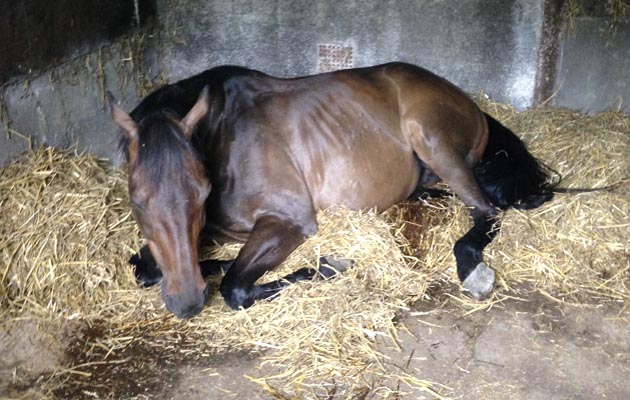Certain types of colic in horses become more common with age — and a number of studies have shown that older horses are more prone to develop serious or life-threatening colic.
With the increasing equine life expectancy and the growing population of geriatric horses in the UK, the incidence of such cases is likely to be rising. Although the reasons why older horses are more prone to some types of colic are not entirely clear.
Dental conditions, including gum and periodontal disease, diastema (gaps between cheek teeth) and lost or fractured teeth are common in geriatric horses. These diseases may create obvious chewing difficulties and quidding (spitting and dropping partly chewed food), but they may also lead to less evident chewing inefficiencies.
Subsequently, the horse may swallow poorly chewed fibre. This may predispose him to impactions of the large colon and to the formation of firm balls of fibrous food material called faecaliths that can get stuck within — and block — the large or small colon.
Both conditions can cause colic due to obstruction of the intestine. Large colon impactions usually require intensive medical treatment, whereas surgery is often required to clear obstruction caused by faecaliths.
For these reasons, regular dental care by either a vet or a qualified equine dental technician is particularly important as a horse ages.
A weighty issue
Another common cause of serious colic in geriatrics is strangulation of the intestine (usually the small intestine) by a pedunculated lipoma.
Considered a form of benign tumour, lipomas are fatty lumps that grow inside the abdomen and are very common in older horses and, especially, ponies. They are often pedunculated, meaning that they grow on a stalk (rather like a conker on a string).
Unfortunately, the pedunculated lipoma can become wrapped around the small intestine and cut off its blood supply. The result is pain (colic) and death of the affected segment, which requires urgent surgical treatment if the horse is to survive.
The reason older horses and ponies develop lipomas is unknown, but they are frequently seen in obese animals. Obesity is a common problem in geriatric horses — one recent study found that 26% of horses aged over 15 years were obese (with a body condition score greater than three out of five), compared to only 4.5% that were underweight (scoring less than two).
Maintaining a good but not overweight body condition is therefore likely to reduce the risk of older horses developing lipomas.
It is very easy to overfeed geriatric and retired horses unintentionally. Taking professional advice about appropriate nutrition, either from your vet or from a qualified nutritionist, is a sensible path to follow.

Pedunculated Lipoma
Surgical risks
The question as to whether it is sensible or “right” to undertake colic surgery in older horses and ponies is very difficult to answer.
Colic surgery is major and expensive, and the financial implications of performing such surgery must be carefully considered.
The procedure also carries with it significant risks. Although there have been dramatic improvements in the success rates of colic surgery over the past 30 years, some horses will not survive and some that do will develop complications which may be life-threatening themselves.
The risks of non-survival or of developing serious complications after colic surgery are higher with particular types of colic and also with longer duration of the condition. Strangulation of the small intestine (perhaps by a pedunculated lipoma) is one of the diseases that carry higher non-survival and complication rates than many other types of surgical colic.
In addition, geriatric horses may not always show the typical signs of serious colics. For this reason, as well as the fact that retired animals may not be checked as frequently as younger working horses, the severity of the problem may not be recognised until later in the course of the disease — which may have a negative effect on the outcome.

Difficult decisions
Increasing age can have many effects on the health of a horse, including a less efficient immune and digestive system, slower wound healing and increased susceptibility to stress.
These factors need to be taken into consideration when contemplating any surgery in older horses.
Despite all of these concerns, research has shown that survival and complication rates of geriatric horses undergoing colic surgery are really no different from those of younger horses affected by similar diseases. However, because strangulating diseases of the small intestine are more common in old than young horses, the survival rate in older horses undergoing colic surgery is lower.
A recent large study from an equine hospital in the USA looked at the percentage of horses undergoing colic surgery that survived and were later discharged. This short-term survival rate was 60% for geriatrics (defined as horses older than 16), compared with 80% for younger horses. In horses over 20 years the rate fell to 53%.
However, when looking at survival rates for horses specifically affected by small intestinal strangulations, there was no significant difference between old and young horses. This study also reported that more geriatric horses were euthanised either without going to surgery or during the colic surgery for financial reasons.
Taking all of this information together, and when financial considerations are ignored, it is clear that old horses can survive colic surgery just as well as younger animals. What’s important is to recognise colic signs early and to weigh up the considerations unique to a particular horse.
Ref: Horse & Hound; 27 August 2015

